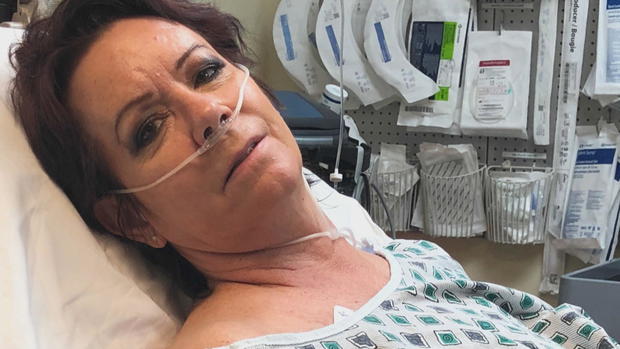Hormone therapy clinics could be putting patients in danger
Medical clinics across the country are advertising a treatment some believe is a fountain of youth. They're selling hormone therapy as a way to make people look and feel younger. But a CBS News investigation finds this may be putting patients at risk.
Last year, at the age of 60, Cindy Kinder-Benge was rushed to a hospital in New Albany, Indiana, with a heart rate four times normal. Two months earlier, she had gone to the emergency room with palpitations.
"A cardiologist walks in and he said, 'Who put you on thyroid medicine?'" Kinder-Benge said.
She had been prescribed a thyroid hormone for menopausal symptoms like hot flashes, even though her thyroid blood levels were normal. She says her cardiologist had her stop taking the hormone because he believed it contributed to her irregular heartbeat.
She was treated by a nurse practitioner at a clinic called 25 Again. Hormone therapy is promoted as a way to help patients lose weight and feel younger. But a CBS News investigation found there are clinics across the country prescribing hormones like thyroid and testosterone to people with normal levels and it's not just 25 Again.
Ultrasound technician Leighann Decker is a former employee of an OB-GYN in Owensboro, Kentucky. The doctor Decker worked for prescribed testosterone to patients with normal testosterone levels looking to turn back the clock.
"More and more practitioners have tried to jump on board and when they've seen the profit that's being made from it. Of course, it's cash pay. It's easy money," Decker said.
The doctor in Kentucky and the practitioner in Indiana both attended seminars given by Dr. Neal Rouzier. He has been promoting hormone replacement therapy for decades and said he's trained thousands of clinicians around the world. During a 2016 deposition, he said he gives testosterone to patients even if their levels are normal.
"I don't care about the number. I treat patients. I treat symptoms," Rouzier said.
Some research suggests testosterone therapy may increase the risk of heart attack or stroke. In 2015, Rouzier dismissed that concern.
"There's thousands of articles to show protection against heart attacks," he said.
But under oath, in that deposition, he was unable to point to any evidence that would back up his claim that his approach to testosterone therapy is safe.
"The problem is that there is no fountain of youth," said Dr. Steven Nissen, a cardiologist at the Cleveland Clinic.
Nissen is leading an FDA-mandated study to see if giving testosterone affects the risk of heart attack or stroke in men with low levels.
"There's no scientific basis for giving hormone therapy to people whose levels are already normal and there's lots of suggestions that it may actually be harmful," Nissen said.
Kinder-Benge is suing 25 Again. The company told CBS News the overall health of their patients is their priority and they make patients aware of any risks. Rouzier declined our request for an interview and did not respond to a list of written questions.
The company 25 Again sent the following statement to CBS News:
We thank CBS News for reaching out to us regarding our company. While we are unable to speak to a particular patient's health because of federal health guidelines (HIPAA), we are eager to discuss the many benefits we provide to our patients and clear up any confusion or false information regarding hormone replacement therapy.
At 25 Again, the overall health of our patients is our priority and our mission. Hormone therapy is only a part of what we do in consideration of a person's health. Many of the patients we see have been turned away by their primary care physician or have not otherwise been able to find help to alleviate symptoms they may be experiencing.
From the start, when a potential patient visits us, we make them fully aware of any possible risks associated with hormone replacement therapy. Patients must sign a consent form before they can participate. Every patient at 25 Again is also required to undergo a physical and blood test, so that our team can first look at each person's health history to decide the best course of action, whether hormone replacement is the best fit for the patient, and the level of hormones needed for the individual patient. Individuals can also opt out at any time, and all patients are directed to, and agree to, remain under the care of another physician for all other medical conditions.
Hormone replacement therapy can be used to alleviate many signs and symptoms known to be associated with certain declining hormones, including inflammation in the body, which is the root cause of many diseases like cardiovascular disease, arthritis, depression, stress and more. Studies show lower hormone levels can cause these symptoms, and hormone replacement therapy can help people reach their optimal hormone levels.
According to the Food and Drug Administration (FDA), normal lab test values are a set of upper and lower limits generally given as a range because normal values vary from person to person. At 25 Again, we treat the patient individually and consider many other factors while addressing hormone levels. We have more than 7,000 customers, many of whom have found relief with this method. If a patient is still experiencing symptoms, additional hormones may be given safely.
Like other forms of medication in the health care industry, before a potential patient signs a consent form, they are informed that this treatment may not be effective for every individual. An individual's lab results are always available upon request, and are often used to show them how wide the range of normal can be for hormone levels.
If you or someone you know have information you'd like to share regarding a hormone therapy clinic, email: investigates@cbsnews.com or contact the CBS News Investigative Unit via one of the methods on our tips page.




